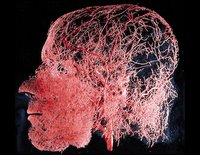
Answers to Yesterday's Blog Questions
Each of the questions from the blog on December 15th are topics being considered in the scientific community. Let's take them one at a time.
Today I'll give you a little more information about the blood-brain barrier. Many recent discoveries have been made, and scientists now have a new view of this dynamic.
The three main functions of the blood-brain barrier are:
1. Protection of the brain from "foreign substances."
2. Protecting the brain from hormones and neurotransmitters found elsewhere in the body.
3. Maintaining a constant environment for the brain.
Large molecules do not pass easily through the barrier. They may be too highly charged, too large, or not lipid soluble. Remember, the brain is mostly fat. Some lipid soluble molecules which pass rapidly into the brain are barbituate drugs.
Certain influences can break down the barrier, as well. Hypertension, or high blood pressure, is one big factor. Microwave exposure can open the barrier. Some infectious agents can cross over. And trauma, inflammation or pressure through injury to the brain can open the barrier.
Then there are the circumventricular organs. These are specific areas of the brain where the barrier is weak.
More information can be found on the Loyola University School of Medicine website, or at the Society for Neuroscience.
To protect the blood-brain barrier, we can follow all the same suggestions for maintaining a healthy brain, such as use of fish oil to help keep free radicals in check, maintaining hydration with lots of fresh water, and avoiding excessive chemicals in the diet.
It also helps to avoid banging your head against the wall.
Earlier this week I banged my head into a tree. It wasn't much of a notable accident -- I was returning from the mailbox, reading an advertisement, and forgot to pay attention to a familiar obstacle. What I noticed after the initial stun was a heightened sensory system -- more sharpness and vividness visually, more alertness in general. This is probably due to an adrenalin release from the trauma, but it did last into the next day or two.
I'll let you know what my research turns up on mild head trauma.
Meanwhile, take good care of yourself during the holidays, and if you're going to bump your head, run into some mistletoe.
An extra dose of cheer to you all,
Suzanna
No comments:
Post a Comment